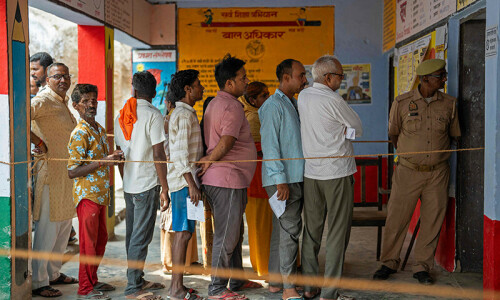WASHINGTON, March 14: With US special envoy Gen Anthony Zinni in the Middle East trying yet once again to arrange a truce, President George Bush has distanced himself somewhat from the week’s ferocious Israeli blitz against Palestinian towns and refugee camps.
At a news conference at the White House, his first in five months (partly reported in Dawn on Thursday), Mr Bush said what the Israelis had done was “frankly” not helpful in creating conditions for peace.
Compared to the enormity of the Israeli actions, marked by the free use of heavy armour and missile strikes, this should be seen as the mildest of rebukes from the US president, but the media here has turned it to look as if it marks a new more balanced approach to the Middle East. The president coupled even this mild remark with acknowledgement of Israel’s right to self-defence.
He said: “Frankly, it’s not helpful what the Israelis have recently done in order to create conditions for peace. I understand someone trying to defend themselves to fight terror. But the recent actions aren’t helpful.” The president made no demand on Israel to withdraw from the West Bank.
In his 45-minute press conference, Mr Bush also covered Iraq, when, as already reported, he said President Saddam Hussein was a problem and “we are going to deal with him”, nuclear weapons, and the outcome of the Zimbabwe elections, which he described as flawed and which he rejected.
He also linked a successful outcome of the “war against terrorism” to the creation of conditions for a peaceful resolution of conflicts, indirectly referring to Pakistan-India differences. He said he looked at the anti-terror campaign as providing an opportunity for peace, and said the more firm the US was and “the more determined we are to take care of al Qaeda and deal with terrorism in all its forms, particularly that of global reach, that we have a very good chance of solving some difficult problems —- including the Middle East or the subcontinent. But it’s going to require a resolve and firmness from the United States of America.”
Mr Bush added: “One of the things I’ve learned in my discussions, and at least listening to the echo chamber out there in the world, is that if the United States were to waver, some in the world would take a nap when it comes to the war on terror. And we’re just not going to let them do that. And that’s why you hear me spend a lot of time talking to the American people — at least, I hope I’m talking to them, through you — about why this is going to take a long period of time, and why I’m so determined to remain firm in my resolve.”
Mr Bush worked around questions on recent disclosures of a new nuclear posture review which suggested that the US should develop smaller, more streamlined nuclear weapons. While asserting US willingness to work with Russia on reducing the number of nuclear warheads and entering into a long-term arrangement on this score, Mr Bush said he was interested in an arsenal that could keep the peace, and underlined the need for verification. The US nuclear capability was a “way to say to people who would harm America: ‘Don’t do it.’”
Mr Bush was repeatedly brought back to the Middle East, when he described Gen Zinni’s mission as an effort to persuade Israelis and Palestinians to implement the Tenet security plan and then move on to the Mitchell Committee report, pointing out that the two plans had been accepted by both sides.
On the US-sponsored resolution passed by the UN Security Council on Tuesday, which is widely seen as a move to scotch a Syrian resolution that was more forthright on the issue of Israeli occupation, Mr Bush said the resolution was moved to give a universal message that could lead to a more peaceful world. He said the Saudi peace plan was important because it recognized the right of Israel, and the president gave the impression as if he believed that this was something new. Israel’s right to exist has been repeatedly accepted by the Arabs, and is mentioned in UN resolutions 242 and 338, which also call for an end to Israeli occupation.












































Dear visitor, the comments section is undergoing an overhaul and will return soon.